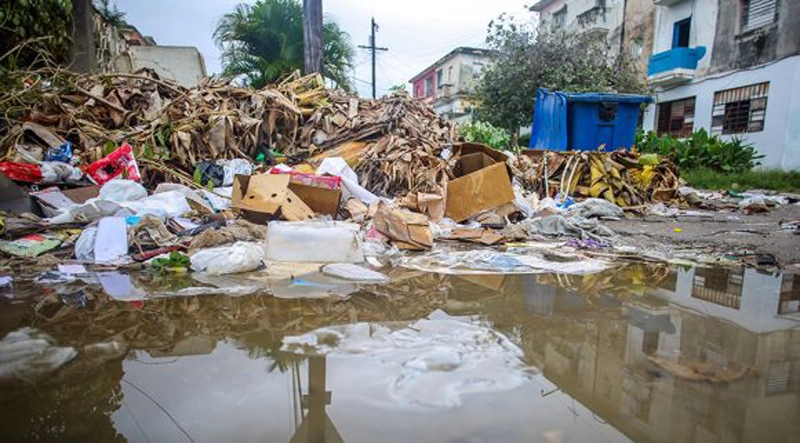Holguin is besieged by a silent, winged enemy, and it seems that a part of the city is determined to shelter it. While health authorities fail to declare a state of emergency due to the aggressive spread of dengue and chikungunya. A glance at the streets, vacant lots, and clogged sewers reveals an alarming contradiction. We are complicit through our inaction regarding the lack of hygiene that is making us sick.
The passage of Hurricane Melissa through eastern Cuba not only left flooding but also a trail of debris and plant material that has become the commonplace landscape. However, what was a natural disaster is now becoming a health disaster due to citizen irresponsibility.
Small illegal dumps are proliferating with a social and institutional indifference that is shocking. Every pile of garbage is a breeding ground for mosquitoes. An open-air vector breeding site.
It is both easy and necessary to point out the shortcomings of the Municipal Directorate of Community Services. The lack of resources, fuel shortages, and insufficient staff are self-evident truths that explain the irregular garbage collection.
The support from other provincial entities, while vital, is a band-aid solution that fails to contain the filth. However, this diagnosis cannot be a blank check for citizen inaction nor the perfect excuse to evade our own responsibility.
Minimizing these viruses is a fatal mistake. Dengue is not a simple “breakbone fever.” Its severe forms, such as dengue hemorrhagic fever. It can cause internal bleeding, organ failure, and death. Chikungunya, for its part, is characterized by debilitating arthralgia—intense joint pain—that can persist for months or even years. Turning the life of the sufferer into an ordeal of reduced mobility and chronic pain.
These are diseases that not only incapacitate during the acute pase. They leave a disabling mark and an overwhelming burden on an already strained healthcare system.
There is a dangerous cognitive disconnect: we know that the mosquito is the vector. That it bites during the day, that it reproduces in any container of clean water. We hear it on the radio, we see it on television, and we read it on the web and in newspapers. But this knowledge doesn’t translate into the basic action of eliminating potential breeding grounds in front of our houses. Properly bagging garbage, or managing yard waste without turning it into a neighborhood problem.
Moreover the final battle against these epidemics isn’t fought solely in laboratories or doctors’ offices. It’s fought on the street corner where an abandoned tire fills with rainwater. In the yard where an eggshell becomes an incubator, and in the garbage bag that, out of laziness or negligence. It doesn’t wait for the collection truck and ends up torn open in the street. Neighborly solidarity, so lauded during hurricanes, is conspicuously absent in the most basic and ongoing task of sanitation.
The Cuban state has the obligation to optimize its resources and strategies. But society has the inescapable civic duty of self-management.
Until we understand that public health is, above all, a collective endeavor that begins at the doorstep of every home. We will continue digging our own epidemiological trap and lamenting infections and long-term consequences that are largely preventable.
Futhermore the result is not only a degraded urban landscape, but a constant trickle of patients in the hospital and, in the most serious cases, in the cemetery. That is why every family in Holguin has the power to eliminate the causes of this epidemic. So as not to suffer the consequences we are experiencing these days.
By: Daimy Peña Guillén
- Sugary Drinks Accelerate Aging - 26 de February de 2026
- Experts Warn About Sleep Quality When Sleeping with Your Phone - 25 de February de 2026
- Communications Sector in Holguin Rejects Blockade Against Cuba - 25 de February de 2026

